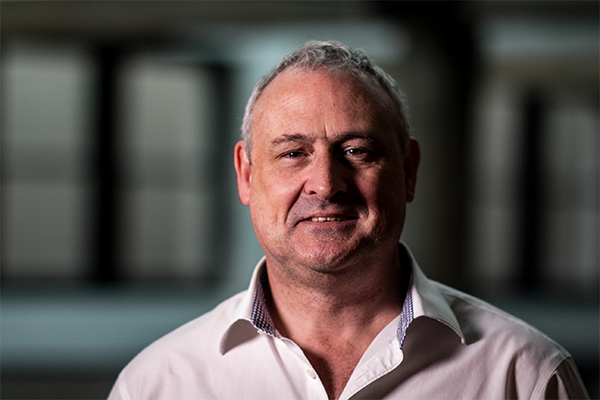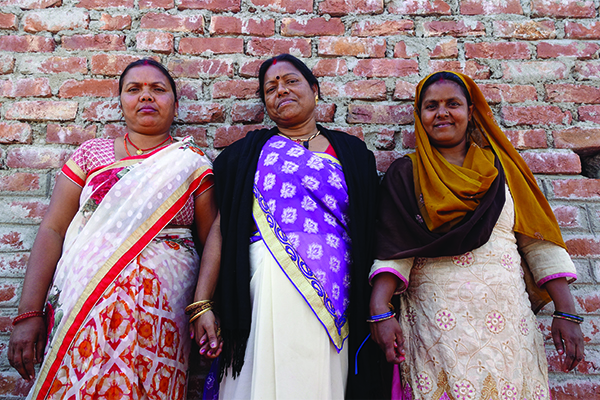Meet Mark Daniels

Mark Daniels, Opportunity International Australia's Asia Programs Director.
After years of working as an accountant, Mark Daniels was in search of something different. So he did what many young Australians do: backpacked around Asia. It was there that Mark first learnt about microenterprise development—helping small business owners who lack access to mainstream financial services—and realised he could use his skills to help others.
Today, Mark Daniels, Opportunity International Australia’s Asia Programs Director, oversees programs in India, Indonesia and Bangladesh. We recently sat down with Mark to find out what he has learnt from his two decades working with communities living in poverty.
Q: What drew you to the non-profit sector after working as an accountant?
MARK DANIELS: To answer that question the better question is what drew me to accounting, which actually was all the wrong reasons. I essentially wanted to be a millionaire by the age of 30. I ended up a drug addict of sorts but my drugs were wealth, position and power – those things that tend to drive men.
So, I left the accounting world and backpacked around the world solo for 14 months to find myself and fell in love with Asia. That’s where I first heard about microenterprise development. I thought if I could combine my skills of accounting with helping people that would be great. Fortunately, I managed to get work with Opportunity back in 1998 as a Project Officer. I love my work and am passionate about solving injustice.
“When you serve the poor you are walking on sacred ground.”
Q: Why is it important that Opportunity addresses not just the financial, but health, education and safety needs of people living in poverty?
MD: Microfinance is simply one tool in the poverty alleviation toolbox. To move people out of poverty—given its multidimensional nature—is incredibly complex. The poor need both financial and non-financial services to advance. The microfinance client base provides a great distribution network to those in poverty, by which you add on interventions through an ecosystem of partnerships i.e. health with the aim to build household sustainability. Household sustainability has three stages:
1. Stabilisation – where the aim is to minimise risks to prevent slide back into poverty. Savings and insurance are critical to protect against shocks, such as natural disasters and illness
2. Maintenance – where stability is maintained, and surpluses converted into assets and investments. This usually also requires improvements in health, education, livelihood skills and financial literacy
3. Self-sufficiency – where the household is resilient and moving out of poverty.
Community Health Leaders in Bihar India. After completing training, they share health and sanitation knowledge with their local communities. Photo: Siri Wrigley and Jemma Holden
Q: You spent 10 years living and working in the Philippines for Opportunity. What did you learn during that time?
MD: So much, but I can boil it down to three things. Firstly, when you serve the poor you are walking on sacred ground. Plus, gaining a deeper understanding of the behavioural economics of those living in poverty has been a fascinating and enriching journey.
Secondly, the fundamentals of the microfinance industry are changing, and the future is already happening. Essentially the future of microfinance is a customer-driven financial life leveraging off digital technology.
Thirdly, a host of cultural appreciation issues: namely i) the importance of understanding the host’s culture, values, customs and beliefs. ii) When you are in a foreign country, you are a guest, they are the host and they have the power. iii) You are a foreigner and you will never really understand them. iv) International development is a long-term investment. The measure of the return should also be a long-term one.
“We are the only charity that gives nothing away.”
Q: What are you most proud of from your 20 plus years with Opportunity?
MD: That is a tough question, but one which I have had the privilege of being involved is with a group of scholars – students of our microfinance clients in the Philippines. Over a period of time I acted as a mentor, advisor and coach, and I have seen a number flourish in their studies. I was able to connect some of them with expatriate friends who were working for multinationals who have employed them, and they are on a trajectory to great careers. In essence, all these students needed was an opportunity, otherwise they would likely have been too poor to even attend university.
Q: Why is it critical that we continue to support people living in poverty?
MD: Jesus calls us to serve the poor without qualification. I am inspired by Muhammad Younis, Founder of Grameen Bank in Bangladesh and his book Building Social Business – The New Kind of Capitalism That Serves Humanity's Most Pressing Need.
He writes: “When we want to help the poor, we usually offer them charity. Most often we use charity to avoid recognising the problem and finding the solution for it. Charity becomes a way to shrug off our responsibility. But charity is no solution to poverty. Charity only perpetuates poverty by taking the initiative away from the poor. Charity allows us to go ahead with our own lives without worrying about the lives of the poor. Charity appeases our consciences.”
What I love about Opportunity is what I often say, “We are the only charity that gives nothing away.” We help individuals with loan capital and then, usually poor women, use their own sweat equity to create their own economic choices and future.
Opportunity focuses on four key aspects of the poverty cycle: microfinance, health, education, and safety. Our goal is to help families leave poverty behind.